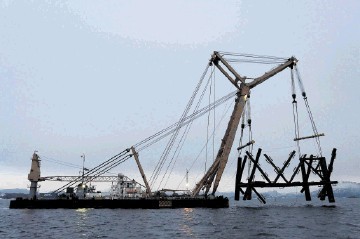
Despite Professor Alex Kemp’s justification for decommissioning tax breaks, any break is a very poor deal for the UK taxpayer. Current levels are set at 75% or 50 % for respective petroleum revenue tax (PRT) paying and non-PRT fields. With estimates of the total decommissioning cost at ca £40billion, the taxpayers’ portion is, by any fiscal measure, a huge sum of money. It equates to approximately £1,000 per UK taxpayer. Furthermore, should decommissioning costs increase, as many suspect they will, the risk to the taxpayer is obvious.
The case for asset removal is presumably based on the environmental benefits gained by returning to a clean seabed. However, the case for a clean seabed is disputed by environmental scientists. Many are of the view that removal activities will cause more damage than good. This would indicate to me that the environmental basis for removal is not compelling. The logical conclusion from this is that the taxpayer is providing a huge amount of money for little or no benefit.
Recently, the GMB has been quite rightly drawing attention to the taxpayers’ role and the need to secure UK onshore decommissioning jobs. What is being missed is that the onshore work is less than 5% of the overall decommissioning costs. Also, the onshore and offshore work has no legacy. When the decommissioning job is complete there is no follow on employment or commercial activity. The money used to decommission is dead – it generates nothing for the nation.
The reason we are undertaking decommissioning is legislation driven, primarily by OSPAR. Despite the OSPAR directives being well intentioned, they are unfortunately taking our nation to a very poor outcome. The taxpayers’ spend is grossly disproportionate to any benefit that might be achieved.
Instead of decommissioning following well P&A, my contention is to make the asset clean and inert, leave in place and utilise the taxpayers’ money, that would have been used for removal, as an investment into renewables. The renewables investment would generate substantially more jobs than decommissioning. The jobs would be sustainable – design jobs, construction jobs and ongoing employment in operations and maintenance for the 25 year or so life of the renewable station. Instead of solely absorbing tax break funding the renewable stations would be generating profit and paying back to the treasury the associated taxes. The power generated by the stations would be of much more value to society than the disputed benefits from a clean seabed and, of course, there would also be a huge environmental positive from carbon footprint reduction.
If legislation is leading to a very poor outcome for the nation, I feel it is incumbent on the Oil and Gas Authority to bring this to the UK Government’s attention. However, they have told me that their role is to enforce legislation, not challenge it, which I find disappointing.
Recommended for you
